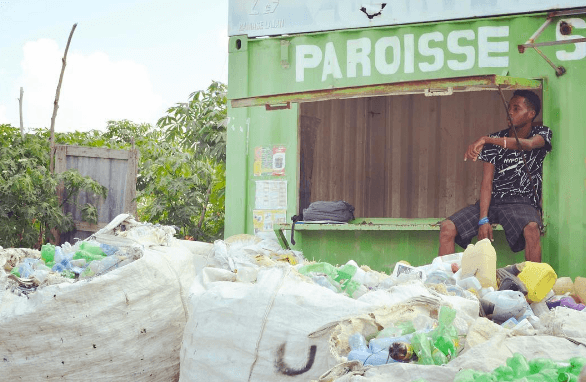
An awful lot of fuss has been made about the relationships between the Clinton Global Initiative (CGI) and its donors. Whisper campaigns – and screaming campaigns – alleged all sorts of nefarious behavior resulting from donations to CGI and the Clinton Foundation. Although the evidence suggests Hillary Clinton’s role centers around glad-handing at most, the current chatter buries the good work the foundation has done since Clinton’s husband left the White House in 2001. From women’s empowerment to vaccines to tackling poverty, it is hard to argue that this organization has not been a force for economic empowerment and social change.
And speaking of enacting change, one of the foundation’s latest social enterprise projects involves one of the world’s poorest nations, Haiti, which is still recovering (if that is the correct word) from the devastating 2010 earthquake.
As is the case with much of Latin America and the Caribbean, trash collectors -- such as the pepenadores in Mexico or catadores in Brazil -- perform some of the most exhausting and low-paying work across the region. This is especially true in Haiti, where income opportunities are few and per capita income is $1,760 a year, according to the World Bank.
To that end, CGI announced a new Commitment to Action that seeks to help boost the working and living conditions of 300 Haitians who collect recyclables for money, 200 of whom are children, by giving them more educational opportunities and access to social services.
Thread, a social enterprise that sources plastic bottles from Haiti and Honduras and churns them into fabric manufactured in the U.S., is leading this effort. Thread and CGI are joined in this partnership by Timberland, HP and the NGO Team Tassy.
By the end of 2019, Thread expects to invest $300,000 in funds and services to finance healthcare services and a support network for these bottles collectors, as well as a field assessment of the program’s success and scalability. Thread says it hopes to repeat this model in regions across the world. Scale would depend on whether the company can score more corporate buyers for the recycled plastic, especially firms seeking a more closed-loop system in the drive to eliminate waste.
So far, Timberland committed this project by buying fabric made from collected bottles for use in some of its shoes and bags. HP will use some of the recycled material to manufacture its ink jet printer cartridges. In a publicly statement, Ian Rosenberger, Thread’s founder and CEO, said such investment is necessary as “the very bottom of the supply chain is where people are the most vulnerable.”
In its most recent annual report, Thread says it is already supporting 3,575 income opportunities and almost 300 jobs in the garbage collection and recycling industries across Haiti. During the reporting period ending in 2015, garbage collectors working with Thread collected over 440,000 pounds of plastic, most of which was shipped to the U.S. and blended with cotton to manufacture jersey, canvas and denim fabrics. That is a steep decline from 2013, when 660,000 pounds were collected – a decrease Thread attributes to low oil prices, which makes recycled materials far less price-competitive than virgin materials.
Nevertheless, Thread’s work with the support of CGI is critical to keep people employed and keep trash out of landfills and even oceans. Garment manufacturers and retailers that insist they want to do “good work” should take a look at Thread -- and social enterprises that share a similar model -- if they really want to make their clothes more socially and environmentally responsible.
Image credit: Thread/Instagram

Leon Kaye has written for 3p since 2010 and become executive editor in 2018. His previous work includes writing for the Guardian as well as other online and print publications. In addition, he's worked in sales executive roles within technology and financial research companies, as well as for a public relations firm, for which he consulted with one of the globe’s leading sustainability initiatives. Currently living in Central California, he’s traveled to 70-plus countries and has lived and worked in South Korea, the United Arab Emirates and Uruguay.
Leon’s an alum of Fresno State, the University of Maryland, Baltimore County and the University of Southern California's Marshall Business School. He enjoys traveling abroad as well as exploring California’s Central Coast and the Sierra Nevadas.














